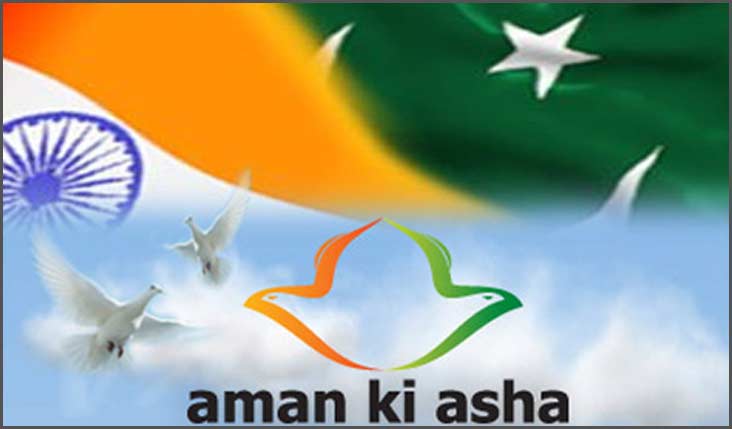By Amir Zia
KARACHI: A two-day strategic seminar, covering a wide-spectrum of Pakistan-India relations starts on Tuesday in the commercial hub of Karachi, in which top former security officials, diplomats, politicians and intellectuals will explore ways to improve relations between the nuclear-armed South Asian neighbours.
The seminar titled “Re-engagement for peace” is the second in this series being organised jointly by Pakistani media giant, the Jang Group, and the Times of India under their Aman Ki Asha (AKA) initiative – the first of its kind civil society peace movement that has completed one year of its launch in January this year.
Taking forward the lead given in the first seminar – held in April 2010 – that unanimously concluded that the people of Pakistan and India share “a common destiny,” delegates from the two sides will discuss a number of topics bedeviling relations between the two nations and possibilities of their cooperation and ways to boost people-to-people contact.
One of the key highlights of the seminar will be presentations by French and German Ambassadors to Pakistan Daniel Jouanneau and Dr Michael Koch. They will share how France and Germany, which had a long history of hostilities and bloody conflicts, entered an era of friendship and economic integration and how Pakistan and India could learn from this experience.
Resolving bilateral issues, commerce and trade, counter terrorism, people-to-people contact and “re-engagement: changing the paradigm at the official level” are the other key themes which will be discussed in the six sessions of this seminar. A special separate session on media has been planned in which Ravi Dhariwal, Managing Director, the Times of India and worldwide President of International Newspapers Marketing Association, will give a presentation on the making of “The Times of India brand.”
The Indian side will be represented by former Indian foreign secretary Salman Haidar, Member Parliament Rajeev Shukla and Manvendra Singh, former chief of Research and Analysis Wing (RAW) A S Dulat, Professor of International politics at Jawaharlal Nehru University Amitabh Mattoo, diplomat and member of Indian National Congress Mani Shankar Aiyar and Director Center of Dialogue and Reconciliation Sushobha Barve.
Pakistan will be represented by the country’s former high commissioner to India Aziz Ahmed Khan, former envoy to United Kingdom and United States Dr Maleeha Lodhi, Federal Tax Ombudsman and former Director General Intelligence Bureau and Inspector General of Police Dr Shoaib Suddle, former Director General of the Inter Services Intelligence Lt Gen (R) Javed Ashraf Qazi, former director of Federal Investigation Agency Tariq Pervez, former Governor State Bank Dr Ishrat Hussain, former Senator Shafqat Mehmood, President Pakistan Business Council Asad Umar and Managing Director Kashf Foundation Roshaneh Zafar. Former National Security Advisor and Pakistan’s Ambassador to the US Maj Gen (R) Mahmud Durrani will be the moderator of the conference.
The opening and concluding sessions will be open for the media, while rest of the discussions will be held in closed-doors. The event will take place at the plush Avari Towers hotel in Karachi.
In the first seminar of this series, held last year, delegates had a consensus that Pakistan and India would reap dividends of progress and prosperity if Islamabad and New Delhi resolve their differences on crucial issues, including the divided region of Kashmir, and ensure economic cooperation. For this, they recommended that the two countries should re-engage at the official as well as people-to-people level. Since then, a number of programmes have been held in both Pakistan and India under AKA’s umbrella to achieve a consensus on vital issues and promote friendship and goodwill between the two countries.
In the coming high-profile seminar, participants will focus on methods of engagement and try to identify important “stakeholders of peace,” to provide impetus to the peace process. On the crucial topic of “resolving Issues,” participants will discuss principles, methods and a possible mechanism for resolving outstanding disputes including on Kashmir, Sir Creek and Siachen that kept relations estranged between the two countries for more than 60 years despite lengthy bilateral talks and the prodding of the international community and bodies like the United Nations.
In the session on counter-terrorism, which also has become a burning topic between the two sides, participants will discuss how Islamabad and New Delhi can cooperate to develop an enduring and robust mechanism both at the level of the people and the governments to defeat this threat. The increasing role of narrow-minded religiosity on both sides will also be discussed along with solutions to promote tolerance in the region.
Participants will also discuss the important issue of people-to-people contact, which faces the obstacle of restrictive visa regimes and negative propaganda because of which the new generation of Indians and Pakistanis remain largely unaware of their common cultural heritage.
Robust commerce and trade ties pivotal for peace and stability in the region remain one of the main themes of the seminar. Top experts and business leaders will discuss the scope and potential of not just India-Pakistan trade and economic cooperation, but among all Saarc nations, which could help bring peace, progress and prosperity in the region which is home to more than 1.8 billion people.








